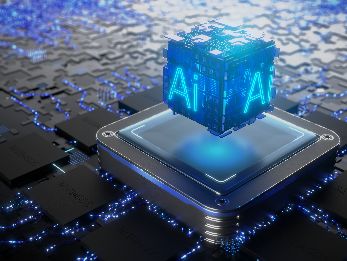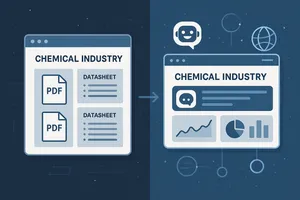These 6 AI Tools For Code Generation Are Your Magic Wands
7 mins | 26 Mar 2024

Table of content
3. Popular AI Code Generation Tools
Introduction
Have you ever felt the frustration of staring at a blank screen, desperately trying to churn out that perfect line of code?
Or you're a beginner, overwhelmed by the seemingly endless syntax and structures. Well, fear not, fellow programmers, because the future of coding has arrived: AI Code Generation.
AI tools are making waves in the programming world, offering developers a range of functionalities that can boost productivity, enhance creativity, and even simplify complex tasks.
But before jumping on the AI bandwagon, let's dig deeper and explore these artificial intelligence tools' potential benefits and limitations.
What is AI Code Generation?
Think of AI code generation as having a super-powered coding buddy at your side. These tools leverage machine learning models trained on massive code datasets to understand patterns, syntax, and best practices. Based on your input, they can:
- Generate complete code snippets or functions: Describe what you need in natural language, and the AI tool spits the code! For example, tell it to "create a function that sorts a list of numbers in descending order," and voila!
- Complete your code automatically: Say goodbye to tedious typing! These tools analyze your existing code and context to suggest the most likely next lines, saving you time and effort.
- Translate code between languages: Need to switch from Python to Java? No problem! AI can effortlessly translate entire codebases, ensuring compatibility and saving you from manual conversion headaches.
- Identify and fix bugs: Are you stuck on a stubborn bug? Some AI tools can analyze your code, pinpoint potential issues, and suggest fixes or alternative approaches.
6 Popular AI code generation tools to consider
1. GitHub Copilot: This powerful tool, powered by OpenAI Codex, provides intelligent code completions, suggesting relevant code snippets, functions, and even entire lines based on your code and context. Compatible with various IDEs and supporting multiple languages, it's a versatile companion for developers.
2. Tabnine: This free and open-source tool utilizes deep learning to offer context-aware code suggestions. Whether you're working with over 20 supported languages or utilizing popular IDE integrations, Tabnine promotes a user-friendly and efficient coding experience.
3. DeepMind AlphaCode: While not publicly available, this research project by DeepMind has garnered significant attention for its impressive performance in coding challenges. AlphaCode showcases the potential of AI to assist developers in diverse coding tasks, paving the way for future advancements.
4. Salesforce Einstein Code Builder: Explicitly designed for Salesforce developers, this AI-powered tool streamlines development by generating code for various Salesforce functionalities. It automates repetitive tasks and suggests relevant code snippets, saving developers valuable time and effort.
5. Codota: This AI-powered platform offers various developer tools, including intelligent code completion and suggestion features. By analyzing your codebase and context, Codota provides relevant suggestions, helping you write better code faster.
6. Replit: This cloud-based platform features "Replit Copilot," an AI code assistant that offers code completion and suggestion functionalities. For beginners or those who prefer a browser-based environment, Replit provides a good starting point.
Benefits of AI Tools
1. Enhanced Productivity: AI can automate repetitive coding, freeing up your valuable time to focus on the more creative aspects of development. Imagine churning out essential functions or data structures in a fraction of the time, allowing you to dedicate more energy to crafting the unique logic of your project.
2. Reduced Errors: We've all been there - a single misplaced semicolon can send your entire program into a tailspin. AI tools can act as vigilant code reviewers, highlighting potential errors and suggesting corrections, which can significantly improve the accuracy and efficiency of your development process.
3. Learning and Exploration: New to a programming language? Feeling stuck on a complex problem? AI tools can be invaluable learning companions. By analyzing your code and offering suggestions, they can help you understand coding patterns, explore new functionalities, and accelerate your learning journey.
4. Accessibility and Democratization: For those without extensive coding experience, AI tools can bridge the gap. By translating natural language requirements into basic code structures, these tools can empower citizen developers and non-programmers to participate in creating more straightforward applications and contribute to their workflows.
6. Boosting Creativity: Let's face it: even seasoned developers can experience burnout or hit creative roadblocks. AI can spark new ideas by suggesting alternative code structures or functionalities you might not have considered. Think of it as a brainstorming partner, pushing you to explore different approaches and potentially leading to more innovative solutions.
Limitations and Concerns
While AI code generation holds immense potential, it's crucial to acknowledge its limitations and potential downsides:
1. Limited Understanding: AI tools are still under development, and their understanding of complex logic and nuanced coding requirements can be limited. They might generate efficient code but lack the elegance and efficiency of hand-written code by an experienced developer.
2. Black Box Effect: The inner workings of AI code generation are often shrouded in mystery. This can be concerning, as developers might blindly trust the generated code without fully understanding its logic or potential security vulnerabilities. Transparency and explainability are crucial aspects that need further development.
3. Ethical Considerations: As with any powerful technology, ethical concerns surround AI code generation. Over-reliance on these tools could hinder the development of programmers' critical thinking and problem-solving skills, potentially leading to a generation of developers relying solely on AI assistance rather than honing their coding abilities.
4. Job Displacement Fears: A common concern surrounding AI in various fields is the potential for job displacement. While AI tools are unlikely to replace experienced developers entirely, they might automate specific tasks, potentially impacting roles heavily reliant on repetitive coding functions.
Conclusion:
AI code generation tools are not meant to replace human expertise; they are collaborative partners, empowering developers to write better code faster. By understanding its potential and limitations, you can leverage these tools to enhance productivity, accelerate learning, and spark creativity.
Remember, the future of coding lies in collaboration between humans and AI, where developers utilize their expertise to guide and utilize these intelligent assistants, ultimately leading to a more efficient, innovative, and accessible coding landscape.
Author

Share
Share
Related

Your Website is Invisible to AI - Here's the 7 Pillar Fix (2026 Guide)
10 mins : 18 Feb 2026

Frictionless Checkout: Why Simplicity Wins Every Time?
5 mins : 18 Sept 2025

The Future of Chemical Websites: AI, Automation, and Smarter Buyer Journeys
7 mins : 10 Sept 2025










